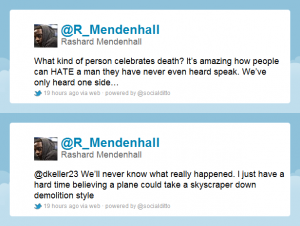By Eric B. Meyer
I’m guessing that social media is not at the top of either side’s list of demands in the current National Football League labor negotiations.
However, player tweets like this and, in particular, this one from Pittsburgh Steelers running back Rashard Mendenhall following the death of Osama bin Laden, have some speculating that a new collective bargaining agreement could include restrictions on player use of social media.
What could those restrictions be? And will the players agree to them?
Monitoring player use of social media
Len Pasquarelli of TheSportsXchange.com reports that the NFL may utilize a social-media monitoring system that many Division I colleges have already employed to monitor athlete use of social media.
The system…tracks the posts of athletes from many of the client universities’ major teams. The program identifies 500 key words — most of them from a range of subjects dealing with drugs, alcohol, sex, race and violence — and red-flags any messages using the terms.
Within 2-3 minutes, a cautionary e-mail is dispatched to the school and the athlete.”
 The price is right. It is $1,500 per year for one college team, and $5,000 to track 500 athletes in all sports.
The price is right. It is $1,500 per year for one college team, and $5,000 to track 500 athletes in all sports.
Player use of social media can be a headline grabber
I have consulted with many employers about social media issues. And, in doing so, I have been asked to speak with employees about responsible social media use. Do employees understand that their employer may want to monitor their social media use? Many do. Do employees like the idea of employers monitoring them online, even when they are “off-the-clock”? No.
But it’s not as if employers enjoy monitoring social media use either. Further, employers recognize that employees often use social media to speak their minds. And, more often than not, social media expression has nothing to do with work. Therefore, most employers are generally not concerned with employee use of social media off-the-clock, unless it exposes the employer to potential liability or cast the employer in a bad light.
However, given the high profile of the league, the NFL seems more concerned than most employers about the breadth of online conduct that could reflect poorly on the league. For example, after Rashard Mendenall tweeted about the death of Osama bin Laden, the Pittsburgh Steelers responded quickly by posting on its website a statement from team President Art Rooney to remove any perception that Mendenhall was speaking for the organization:
I have not spoken with Rashard so it is hard to explain or even comprehend what he meant with his recent Twitter comments. The entire Steelers’ organization is very proud of the job our military personnel have done and we can only hope this leads to our troops coming home soon.”
Would someone who viewed Mendenhall’s tweet assume that the Steelers agreed with his views? Probably not. Still, given that Mendenhall has nearly 50,000 followers on Twitter, his tweet was “retweeted” over 100 times, and the press covered it, the team had no choice but to respond.
The Mendenhall example is but one of many that has received media attention and which many teams feel gives a black eye to the league. Therefore, I can imagine that most teams would prefer that players think twice before hitting the send button.
Will the players go for social media restrictions?
Mike Florio for ProFootballTalk.com questions whether the two sides could ever see eye-to-eye on this issue. I tend to agree. Any type of social media censorship, especially as it may relate to on-the-field issues, will be tough for the players to accept.
This was originally published on Eric B. Meyer’s blog, The Employer Handbook
